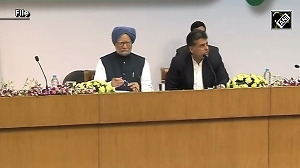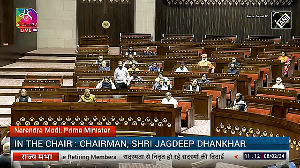Days after it voted for splitting of Al Qaeda and Taliban on the United Nations sanctions list, India has said the challenge before this regime is to ensure elimination of terrorism and warned against any 'dilution' of efforts in this regard.
The challenge before the UN's 1267 resolution which established the sanctions regime 'is to ensure complete commitment to eliminating the scourge of terrorism, and to resist the dilution of such efforts for reasons that may seem compelling today but may not withstand the test of ground realities," Foreign Secretary Nirupama Rao said.
Though India had reservations, it recently voted in favour of a United Nations Security Council resolution splitting Taliban and Al Qaeda in the international sanctions regime in a bid to help Afghan government's reconciliation and reintegration efforts with insurgents.
"We also consider the 1267 regime against Al Qaeda and Taliban as a core instrument available to the international community in our fight against terrorism," Rao said on Monday, addressing the International Institute for Strategic Studies in London.
In her speech, Rao also briefed the think-tank about India's reconstruction efforts in war-torn Afghanistan. "We help Afghanistan in its reconstruction efforts with the aim of bringing peace and stability in that country," she said.
India's assistance programme is spread across Afghanistan and spans almost the entire gamut of economic and social developmental activities. It places particular emphasis on capacity building and human resource development, Rao said.
The Foreign Secretary also explained India's 'Look East' policy which she said has seen the country's quick integration with Southeast and East Asia at the strategic, political, economic, cultural and people-to-people levels.
The 'Look East' policy, enunciated in the early 90s, represented India's vision of the changing dynamics in international relations, she said.
"It was meant, at a fundamental level, to reconnect and reach out in the civilisational space we share with our near neighbours in Southeast Asia, and catalyse the sharing of capacities and opportunities to improve the economic well-being of our peoples.
Our relationship with the Association of Southeast Asian Nations was the natural pivot in this deepening collaboration. It is a fact little recognised that India is as much a Southeast Asian nation as a South Asian nation, given the rich linguistic and ethnic mosaic of our Northeast, and the fact that we share borders with a large ASEAN nation -Myanmar," Rao noted.







 © 2024 Rediff.com -
© 2024 Rediff.com -